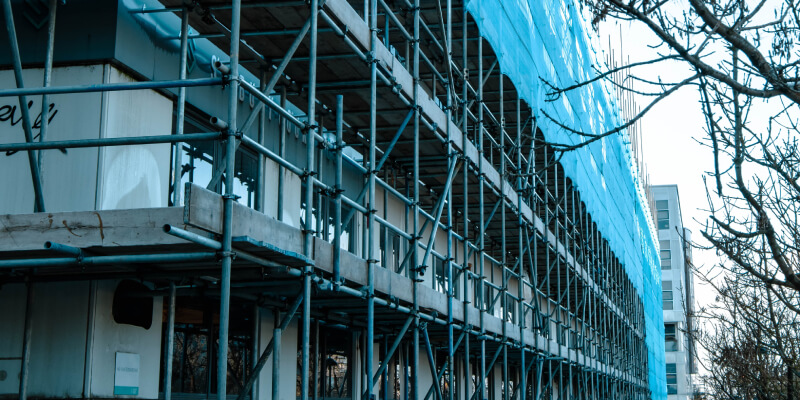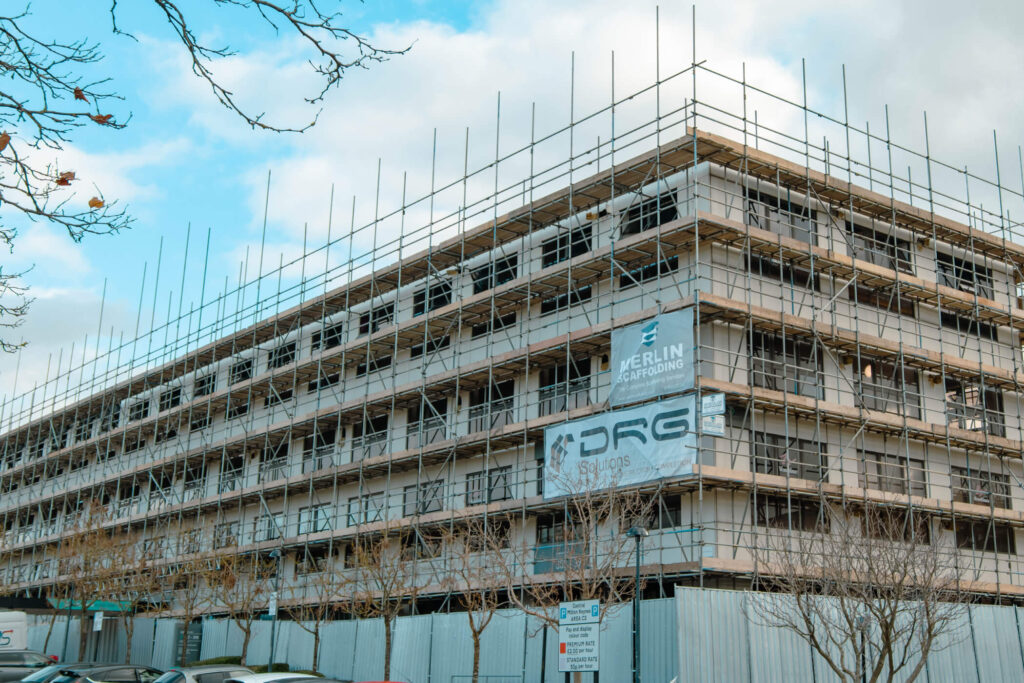For this reason, our experts in scaffolding in Milton Keynes are on a mission to answer all of the most commonly asked questions surrounding the topic. In this article, we will be discussing what is the cost of scaffolding?
What Is The Cost Of Scaffolding? A Merlin Scaffolding Guide
Whether it be a home extension or roofing repairs, many project types require scaffolding to ensure safe and secure operations. Throughout our guide, we will not only detail the costs of scaffolding but also the types you can choose from and how each can be used.
- What Is Scaffolding?
- Average Cost Of Scaffolding
- Temporary Roof Scaffolding Cost
- Do I Need A Permit For Scaffolding?
- Types Of Scaffolding
- Uses Of Scaffolding
- Benefits Of Hiring A Scaffolding Company
What Is Scaffolding?
Scaffolding is a tall, steel temporary structure used to safely support the original property while building or repairing different elements. It also allows builders and other tradespeople on site to reach high-access areas, elevate materials and ensure that they have all tools by their side throughout the process.
Scaffolding was first seen as far back as Ancient Egypt when workers used wood and rope to create their pyramids; this has since been enhanced and has become a safer and sturdier process. In the present day, there are now several types of scaffolding available based on your project type, allowing you to work at height or in hard-to-reach places.

Average Cost Of Scaffolding
The cost of your scaffolding will be determined by the height and type of property you own; for example, a 2-storey semi-detached house typically costs £875 per week, whereas wall work for a terraced house is about £310 per week. These prices can also range from low to high; for example, a high-level chimney scaffolding can range from a lower £400 to a higher £900 per week. However, the average cost for hiring scaffolding is about £200 to £300.
The cost of your scaffolding is included in the quote from professional tradespeople; however, if you need to source the scaffolding independently, the cost for a single scaffold that goes up to 10m in height is usually around £625 every week.
The factors that affect the costs include:
- Length Of The Hire
- Location
- Height
- Level Of Easy Access
Temporary Roof Scaffolding Cost
Temporary roofs are used to maximise the protection of the work going on at your property. Weather conditions and other factors could potentially affect your work, so one of our promises is to keep this at a minimum and protect the scaffolding from limiting any chaos and making sure everything works exactly in your favour. You can choose from a large array of materials and sheets for the cover of your scaffolding; these materials are waterproof to leave your property untouched by extraneous factors that may affect your work.
The costs of your temporary roof scaffolding will always depend on the size of your property and the materials that are used to build the protection. However, the costs usually start from about £3000 and can range up to £30,000 depending on multiple factors, including the size of your property. The reason for this cost is because of the additional and durable materials that are used for the cover and the labour it takes to erect. To figure out the cost of your roof cover, contact us for a free quote where we can assess the requirements of your property!
Do I Need A Permit For Scaffolding?
If you’re erecting scaffolding on a public highway in the UK, you’ll usually require a permit or licence from the local authority. However, it is the responsibility of the builder or scaffolding company to acquire the scaffolding licence. As the property owner, you will need to check whether your scaffolding company has this licence and ensure that it doesn’t expire before the building work is finished. You don’t need a permit to put up scaffolding on private land, but you may need to arrange parking suspensions or close the footway temporarily.
When applying for a scaffolding licence, you must provide details about the site, the type of structure and the work’s intended start and end dates. The cost of a licence varies by location and often includes a deposit. If work goes ahead without a scaffold licence, you could face a fine of up to £5,000.
Types Of Scaffolding
When choosing what type of scaffolding you would like to use for your property, it is important to assess the requirements of your building, such as its height and determine which type to use from there. As with all clients, if you need advice on what design best suits your project, please do not hesitate to contact us for a free survey.
There are two main types of scaffolding; these are:
- Supported Scaffolding: This is the most common type of scaffolding you will likely have seen when walking out and about. The term supported scaffolding relates to any structures that are built from the ground upwards, using the ground as support. They are designed with one or more platforms which are supported using a lumber or pole frame and can be equipped with a ladder for easy access. Supported scaffolding is typically the most cost-effective, safest and straightforward to assemble, making it the most popular choice when hiring a scaffolder. Learn more about the different types of supported scaffolding on the Storee website.
- Suspended Scaffolding: You may see this type of scaffolding and usually think of window cleaners, but this can also be used when building and repairing. Suspended scaffolding is used to create a suspended platform which is hung from either a wire, rope or chain at the top of the building. It is designed with useful switches, levers or pulleys which allow the user to move up or down the building (hence why it is regularly used by window cleaners). As suspended scaffolding hangs from the top of the building, it is commonly used on extremely high structures where using the ground as support simply isn’t feasible.
As a leading scaffolding company in Milton Keynes, we have spent years installing both supported and suspended scaffolding on a wealth of building types. Our reputable team have extensive experience catering to clients with varying requirements, including:
- Domestic Scaffolding: For any home renovations, we can supply you with a domestic scaffolding structure that suits your property type and requirements. We will always ensure that disruption to day-to-day life is kept at a minimum and that all entrances, driveways and paths remain free from hazards.
- Commercial Scaffolding: Having worked closely with businesses across all industries, our commercial scaffolding solutions include the erecting, monitoring and dismantling of structures based on your agreed timeframes. We will always ensure that your scaffolding continues to meet industry regulations during your hire period.
- Industrial Scale: From warehouses or manufacturers and factories, our industrial scaffolding is fully scalable to meet the needs of larger, more complex building types. Along with conventional scaffolding, we can also accommodate solutions with temporary roofing to minimise downtime to daily operations.
To learn more about the different types of scaffolding and their uses, check out our informative article.
Uses Of Scaffolding
Our team at our scaffolding company in Milton Keynes understand that it may be tricky finding out if scaffolding is needed for what you are planning; the main uses are as follows:
- Constrcution: This may be one of the most crucial steps when constructing as it allows builders to get as safely to where they need to build as possible.
- Cleaning: You may think of skyrise buildings when imagining this, and you would be right; scaffolding can allow cleaners to reach high parts of buildings to clean areas such as the windows.
- Industrial Inspections: Scaffolding is a helping hand when it comes to inspections as it allows inspectors to access parts of buildings that they otherwise would not be able to.
Benefits Of Hiring A Scaffolding Company
Installing, monitoring and dismantling scaffolding can be complex, meaning much like other construction work, it is always recommended to enlist the help of a professional. With this in mind, more benefits of hiring a scaffolding company include the following:
Health And Safety: With over 20 years of experience, health and safety remain at the forefront of every project. Our team are not only members of CHAS but also work closely with HS Direct, who provide us with all of the necessary resources to keep our health and safety procedures up to date and in line with the latest regulations.
High-Quality Materials: We use only the highest quality, industry-approved materials for our scaffolding solutions and ensure that all structures are thoroughly vetted before leaving your site. You will always have the peace of mind that you will be paired with a durable, reliable structure.
Dismantling: One of the most complicated steps is safely dismantling your scaffolding, not only ensuring the safety of those on site but also no damage to the building. This stage is always included as standard in our packages and will be scheduled for a date and time that works best for your project.
If you’re looking for an expert scaffolder in Milton Keynes, get in touch now to book your site survey and begin discussing your package!
Everything You Need To Get Started
Now that you have the large amount of knowledge that we can give you about scaffolding and the prices within, you should be able to get started on your own journey. Along with our help, you’ll be guaranteed the best service you deserve and an easy, safe and quick process. Remember to contact us if you need any more information, help or if you want to book a free site survey!
